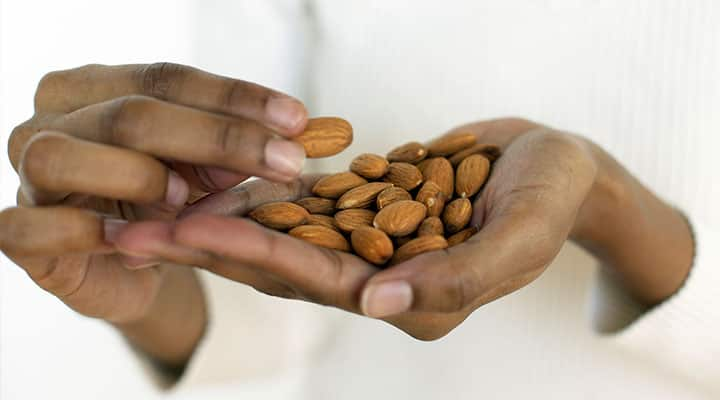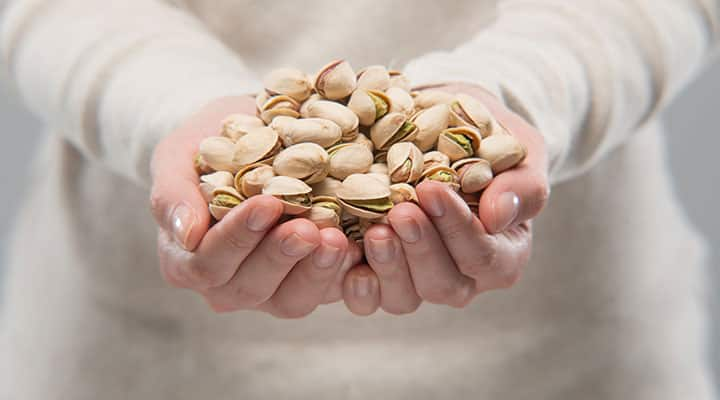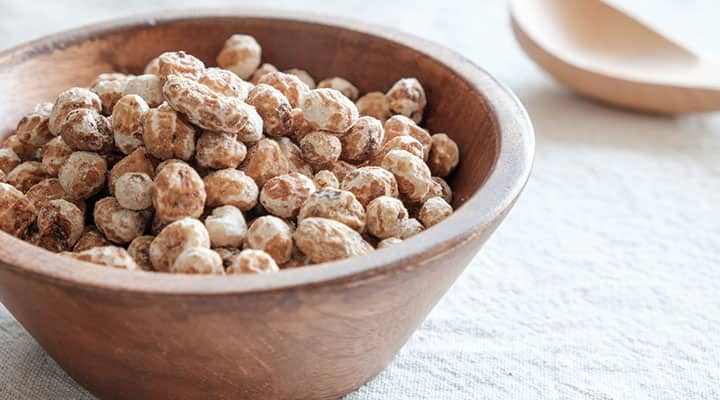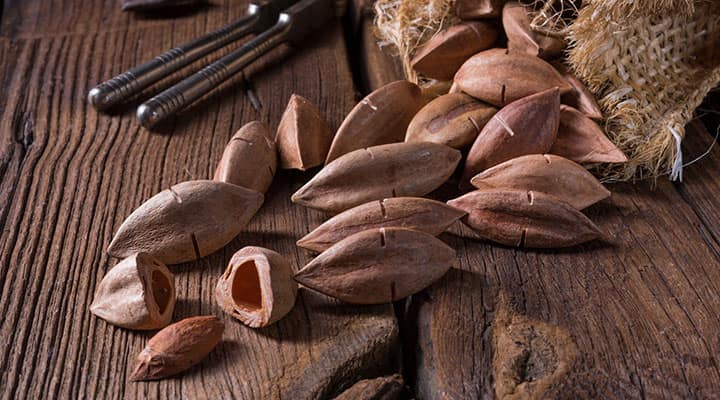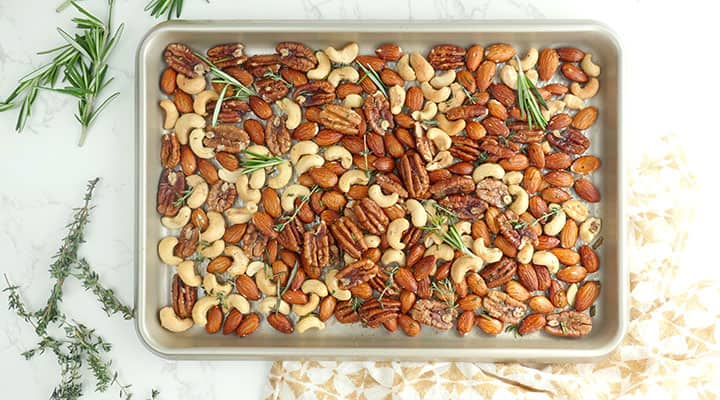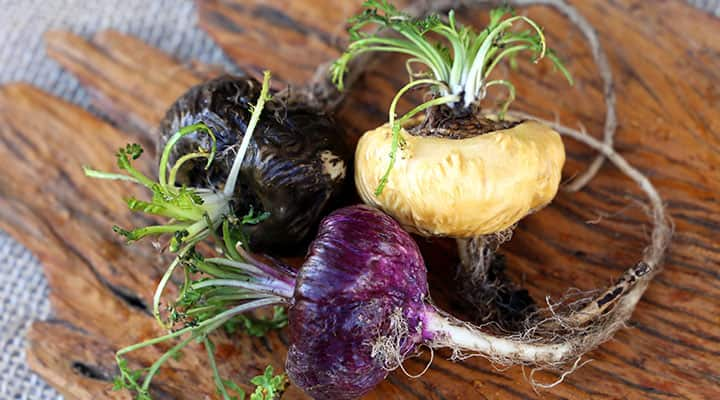
20 Common Nuts You Should Know About
Published: November 2022
Adding a high-calorie, high-fat food to your daily diet might sound nuts, but it's a smart choice in this case. Tree nuts and nut-like alternatives like peanuts (which, despite having "nut" in its name, is technically a legume) are nutrient dense, naturally gluten-free and a good source of plant-based protein.
Numerous studies have shown the health benefits of incorporating nuts mindfully into your daily diet. Learn what makes a nut so nutritious as well as 20 common nuts to incorporate into your diet. You can even get a head start on eating nuts with my healthy rosemary thyme roasted nuts recipe.
What are nuts?
Surprisingly enough, nuts are technically fruits. They are defined as dry, single-seeded fruits that have a high oil content. But some nuts are exceptions. Peanuts, for instance, are legumes, and almonds are classified as "drupes." However, because of their nut-like properties and nutritional profile, they are generally referred to as nuts. Different types of nuts provide varying amounts of plant protein, fiber, phytosterols, vitamins, minerals and healthy fats, including monounsaturated fats, polyunsaturated fats and omega-3 fats.
Health benefits of nuts
Eating nuts in general has been found to provide health benefits, such as supporting heart health, cognitive health, metabolic health, and weight loss and management.
Clinical studies have shown that walnut consumption in particular is associated with decreased risk of cardiovascular disease. Eating nuts regularly may also help improve metabolic markers such as blood sugar, blood pressure, lipid profile (including improving triglycerides and LDL cholesterol), and markers of inflammation and oxidative stress.
Additionally, a clinical trial conducted over six years of more than 3,000 people found that higher nut consumption was related to lower risk of cognitive impairment. People who ate more than or equal to 2.5 ounces (70 grams) of nuts per week had a 17% lower risk of cognitive impairment compared with non-consumers or those who consumed nuts less than weekly.
Also important to note is that nuts are a part of the Mediterranean diet, which has a variety of health benefits, including anti-inflammatory, antioxidant, cognitive, cardiovascular and metabolic benefits. In addition to nuts, the Mediterranean diet includes seeds such as sunflower seeds, extra-virgin olive oil, fruits, vegetables, whole grains, beans and moderate amounts of lean protein such as fish, seafood, dairy and eggs.
What are the 20 most popular nuts?
Adding more nuts to your diet is easy because there are so many delicious options, each with slightly different health benefits. Here are 20 tasty ways to "go nuts."
Almonds:
Almonds are a tree nut known for being a good source of calcium and vitamin E, which is a fat-soluble vitamin and powerful antioxidant. Studies suggest that consumption of almonds may help promote heart health. One paper that reviewed 64 clinical trials and 14 systematic reviews and meta-analyses found that intake of 1.5 ounces per day of almonds for more than six weeks, significantly lowered LDL cholesterol and diastolic blood pressure, which are risk factors for heart disease. Additionally, eight of the studies also found that almonds can help support a healthy microbiome.Hazelnuts:
Hazelnuts (or filberts) are tree nuts known for their unique rounded shape. Hazelnut consumption may also help improve some cardiometabolic risk factors, such as increasing HDL ("good" cholesterol) levels and decreasing total cholesterol and LDL ("bad" cholesterol) levels while not adversely affecting body weight or composition.Peanuts:
Peanuts differ from tree nuts like Brazil nuts, cashews, and hazelnuts because they grow underground, so they are botanically a legume. In healthy individuals, peanut consumption has also been shown to lower ratios of total cholesterol to HDL and LDL to HDL, as well as a decrease in triglycerides, all markers of heart health. Peanut butter is a popular way to enjoy peanuts slathered on toast, or you can incorporate it into baked goods.
Walnuts:
Where walnuts particularly shine is in their omega-3 fatty acid content. Omega-3 fats are typically found in fish and fish oil, with very few plant-based sources. Omega-3 fats are so important that one study suggests that adding more omega-3 fatty acids to your diet can help undo cognitive damage that is worsened by a diet rich in processed foods.
Backing that up, a study of 3,632 adults aged 65 or older found that those reporting any walnut consumption had greater cognitive scores in tests than those who did not. Additionally, preclinical studies suggest that walnuts are neuroprotective, with mechanisms including reducing oxidative stress, anti-inflammatory properties, and helping to protect against cell and DNA damage.Pine nuts:
Pine nuts may be small in size, but they are packed with health benefits. While more research in humans is needed, preclinical data suggests that pine nut oil, and specific fatty acids within it, may help increase energy expenditure, reduce appetite, improve blood and liver lipid profiles, and exhibit anti-inflammatory properties. Besides making an excellent homemade pesto, toasted pine nuts are a great addition to pasta and protein dishes.Brazil nuts:
Brazil nuts are considered tree nuts, and they are known for being an especially good source of selenium. A meta-analysis recently found Brazil nuts can help improve selenium status and protect against oxidative stress.Cashew nuts:
Cashews are also tree nuts. A meta-analysis of 9 studies totaling 392 participants found that cashew nut consumption was associated with a significant reduction in systolic blood pressure compared with the control. Enjoy them in stir-fries as a crunchy alternative to peanuts.Pistachios:
Pistachios offer a trio of nutrients that may help you feel fuller longer—plant protein, fiber and healthy fats. Pistachios are a great source of plant-based protein and are fun to open in addition to being tasty and filling. While peanut butter gets all the nut butter glory, consider making homemade pistachio butter.Macadamia nuts:
As a nut with one of the highest calorie and fat contents—including saturated fat—macadamia nuts have a bit of a reputation among careful calorie counters. However, macadamia nuts can still be a nutritious part of a balanced diet and may even help reduce the risk of heart disease when consumed in moderation as part of a diet low in saturated fat and cholesterol.Pecans:
Pecans are one of the only nuts native to North America. While they provide slightly more saturated fat than most other nuts, they are one of the lowest in carbohydrates. Among nuts, pecans are also one of the highest in antioxidants, which help fight free radicals. They taste great in salads, sprinkled in your morning oatmeal, or in baked goods (like these maple pecan cookies).Black walnuts:
Black walnuts are the lesser-known cousin to English walnuts. While black walnuts and English walnuts look and taste similar, black walnuts contain more alpha- and gamma-tocopherol, which are forms of vitamin E. Black walnuts are a good source of antioxidant and anti-inflammatory compounds, polyunsaturated fats including omega-6, and phenolic compounds.Kola nuts:
While not as well studied as different types of nuts, kola nuts have been found to contain caffeine, which may be beneficial for those looking for an energy boost without the coffee.Tiger nuts:
Tiger nuts are rich in polyphenols, essential fatty acids, and key vitamins and minerals. They also contain antioxidants that can help protect against oxidative stress. A clinical study found that daily consumption for 3 days of a 300 ml drink made from tiger nuts (called horchata) helped support the gut microbiome.Candlenuts:
Another relatively unstudied nut, candlenuts are known to be a good source of fiber, which is important for heart and digestive health.Chestnuts:
Chestnuts are protein-packed and rich in essential fats, antioxidants, and other vitamins and minerals. A preclinical study found that mice eating a diet supplemented with chestnuts had reduced abdominal fat and lower serum cholesterol after 35 days compared with control.Marcona almonds:
Marcona almonds share many of the same benefits of almonds but with a softer, sweeter taste and texture.Pili nuts:
These rich and buttery tasting nuts are low in carbohydrates but more calorically dense and higher in fat than many other nuts.Ginkgo nuts:
Studies suggest that Ginkgo nuts can help lower cholesterol, support brain function, and protect against cancer thanks to their variety of polyphenol antioxidants.Karuka:
While less studied than other types of nuts, karuka nuts are known for being a good source of fiber.Mongongo:
Mongongo nuts provide key minerals and vitamins, including vitamin E.- Preheat the oven to 300 degrees Fahrenheit.
- Place the cashews, pecans and almonds in a large mixing bowl and toss with the oil, thyme, rosemary, salt and pepper.
- Spread the nuts in a single layer on a parchment paper-lined baked sheet.
- Bake for 10 minutes, toss and bake for another 5 to 7 minutes or until roasted.
Rosemary Thyme Roasted Nuts
Ready to claim some of the health benefits of edible nuts? Start with this tasty snack recipe!
Ingredients
1 cup raw cashews
1 cup raw pecan halves
1 cup raw almonds
2 tablespoons extra virgin olive oil
1 tablespoon fresh thyme
1 tablespoon fresh rosemary
1 teaspoon kosher salt
½ teaspoon freshly ground pepper
Preparation
Serves: 12
Prep time: 10 minutes
Cook time: 15-17 minutes
Should you eat nuts every day?
Yes, you can and should eat nuts daily! In 2003, the FDA made a qualified claim about nuts and heart disease indicating that scientific evidence suggests, but does not prove, that eating 1.5 oz (42.5 grams) of nuts each day, as part of a diet low in saturated fat and cholesterol, may reduce the risk of heart disease.
However, because nuts are calorically dense, it is important to be mindful of portions. Enjoying a handful of pistachios for a snack or adding a sprinkling of pine nuts to a salad—or hazelnuts to a soup—are great ways to incorporate nuts.
Additionally, opt for raw or unsalted, dry-roasted varieties to limit added sodium, sugar and excess fat in your diet.
Why is soaking nuts important?
Soaking raw nuts may help reduce phytates (phytic acid), which is an antinutrient that can bind to certain minerals such as zinc and iron and reduce their absorption in the body. Roasting nuts also reduces their antinutrient content.
Are nuts considered processed food?
Processed food has been cooked, canned, frozen or prepared in a way that changes its nutritional composition (for example, fortified cereals). Nuts that are roasted, flavored or salted, for example, would be considered minimally processed, while raw nuts are not processed.
Myth or fact: Nuts will make you fat
This is a myth. Consuming any food in excess can contribute to weight gain. Just like any calorically-dense food, nuts should be portion-controlled. Eating nuts daily is perfectly fine, healthy and might even support weight loss and healthy weight management.
Which nuts are not good for you?
All nuts provide beneficial nutrients when consumed mindfully and in moderation. While some nuts are more calorically dense than others, such as macadamia nuts, they still provide key nutrients and can be a heart-healthy addition to your diet.
If you have a tree nut allergy or peanut allergy, it is important to avoid those nuts and seek out foods that are nut-free. The Life Extension Nuts Blood Test is a convenient way to test for allergies to Brazil nuts, cashews, hazelnuts (filberts), peanuts, pecans and walnuts.
References
- Antora SA, et al. "Quantification of Vitamins, Minerals, and Amino Acids in Black Walnut (Juglans nigra)." Front Nutr. July 2022. https://www.ncbi.nlm.nih.gov/pmc/articles/PMC9363771/
- Baker EJ, Miles EA, Calder PC. "A review of the functional effects of pine nut oil, pinolenic acid and its derivative eicosatrienoic acid and their potential health benefits." Prog Lipid Res. April 2021. https://pubmed.ncbi.nlm.nih.gov/33831456/
- Bishop NJ, Zuniga KE. "Investigating walnut consumption and cognitive trajectories in a representative sample of older US adults." Public Health Nutr. May 2021. https://pubmed.ncbi.nlm.nih.gov/32618237/
- Brown R, Ware L, Tey SL. "Effects of Hazelnut Consumption on Cardiometabolic Risk Factors and Acceptance: A Systematic Review." Int J Environ Res Public Health. March 2022. https://pubmed.ncbi.nlm.nih.gov/35270573/
- Chauhan A, Chauhan V. "Beneficial Effects of Walnuts on Cognition and Brain Health." Nutrients. February 2020. https://pubmed.ncbi.nlm.nih.gov/32093220/
- Dreher ML. "A Comprehensive Review of Almond Clinical Trials on Weight Measures, Metabolic Health Biomarkers and Outcomes, and the Gut Microbiota." Nutrients. June 2021. https://pubmed.ncbi.nlm.nih.gov/34201139/
- Eslami O, et al. "Effect of nuts on components of metabolic syndrome in healthy adults with overweight/obesity: A systematic review and meta-analysis." Nutr Metab Cardiovasc Dis. November 2022. https://pubmed.ncbi.nlm.nih.gov/36058762/
- Finicelli M, et al. "The Mediterranean Diet: An Update of the Clinical Trials." Nutrients. July 2022. https://pubmed.ncbi.nlm.nih.gov/35889911/
- Godos J, et all. "Effect of Brazil Nuts on Selenium Status, Blood Lipids, and Biomarkers of Oxidative Stress and Inflammation: A Systematic Review and Meta-Analysis of Randomized Clinical Trials." Antioxidants (Basel). February 2022. https://pubmed.ncbi.nlm.nih.gov/35204285/
- Jalali M, et al. "The effects of cashew nut intake on lipid profile and blood pressure: A systematic review and meta-analysis of randomized controlled trials." Complement Ther Med. May 2020. https://pubmed.ncbi.nlm.nih.gov/32444052/
- Khalili L, et al. "Nuts as a Part of Dietary Strategy to Improve Metabolic Biomarkers: A Narrative Review." Front Nutr. March 2022. https://pubmed.ncbi.nlm.nih.gov/35425791/
- Li F, et al. "Beneficial Effects of Nut Consumption on Cognitive Function Among Elderly: Findings From a 6-Year Cohort Study." Front Aging Neurosci. April 2022. https://www.ncbi.nlm.nih.gov/pmc/articles/PMC9045130/
- Noor-E-Tabassum, et al."Ginkgo biloba: A Treasure of Functional Phytochemicals with Multimedicinal Applications." Evid Based Complement Alternat Med. February 2022. https://www.ncbi.nlm.nih.gov/pmc/articles/PMC8901348/
- Rodrigues P, et al. "Dietary Supplementation with Chestnut (Castanea sativa) Reduces Abdominal Adiposity in FVB/n Mice: A Preliminary Study." Biomedicines. April 2020. https://pubmed.ncbi.nlm.nih.gov/32260459/
- Selma-Royo M, et al. "Intake of Natural, Unprocessed Tiger Nuts (Cyperus esculentusL.) Drink Significantly Favors Intestinal Beneficial Bacteria in a Short Period of Time." Nutrients. April 2022. https://www.ncbi.nlm.nih.gov/pmc/articles/PMC9104503/
- Yi SY, et al. "Association of nut consumption with CVD risk factors in young to middle-aged adults: The Coronary Artery Risk Development in Young Adults (CARDIA) study." Nutr Metab Cardiovasc Dis. October 2022. https://pubmed.ncbi.nlm.nih.gov/35970686/
Always be in the know!
Access the latest deals, wellness news, expert health tips & more!


